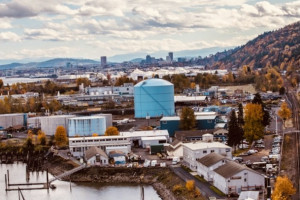
Portland and other Oregon municipalities are required to inventory their employment land periodically as part of the comprehensive planning process. For decades the city has decided during each inventory process that it needs more industrial land. In the past, Portland annexed neighboring towns like Linnton, St. Johns and Albina and turned them industrial sacrifice zones. They have turned greenspaces into heavy industrial zones, filled in wetlands, streams and riverbanks, and once the landscape is contaminated, they move on to new large pieces of land that are buildable with no need for clean-up, leaving the polluted land behind. However, there is growing pressure to change these practices, especially now that the Port of Portland no longer claims it needs additional industrial land.
On this episode of Locus Focus, we talk with the Braided River Campaign's co-founder, Sarah Taylor, about how the acquisition of industrial land impacts a community, influencing health, safety, and economic security for generations to come.
Sarah Taylor has decades of experience as a midwife and educator and was co-founder of the Sunnyside Environmental School. She helped start the Braided River Campaign in 2020 to address the social and political inequities, health hazards and climate impacts of Portland's industrial sanctuaries (or less euphemistically sacrifice zones) along the North Reach of the Willamette River in North and Northwest Portland.
For more information on the Braided River Campaign visit their Facebook page.
- KBOO


